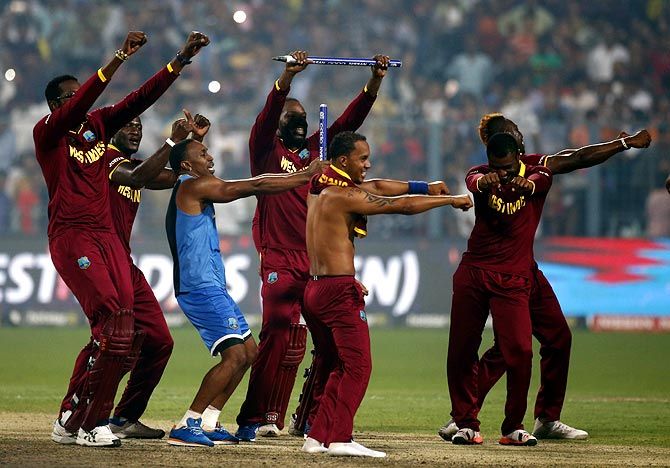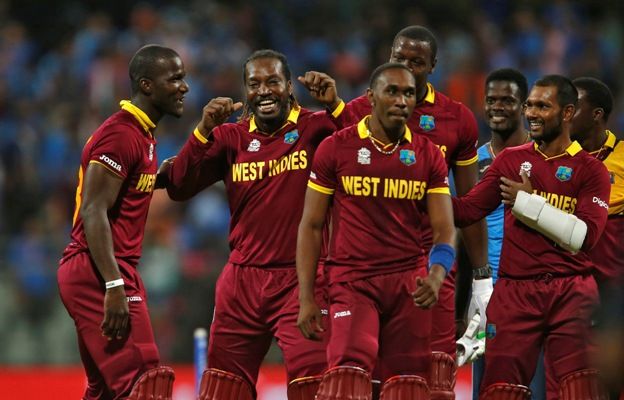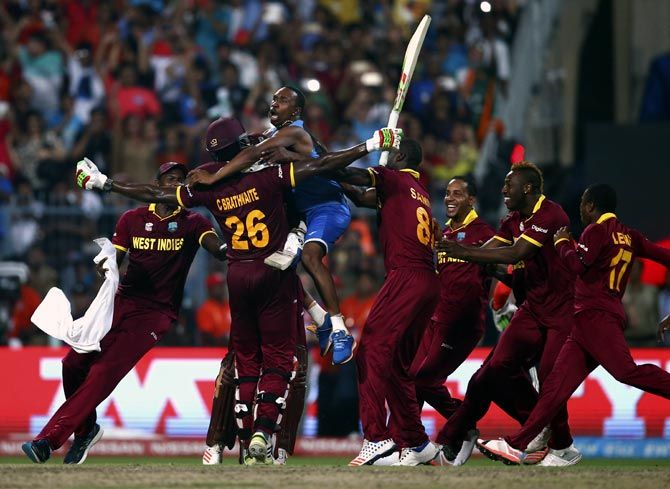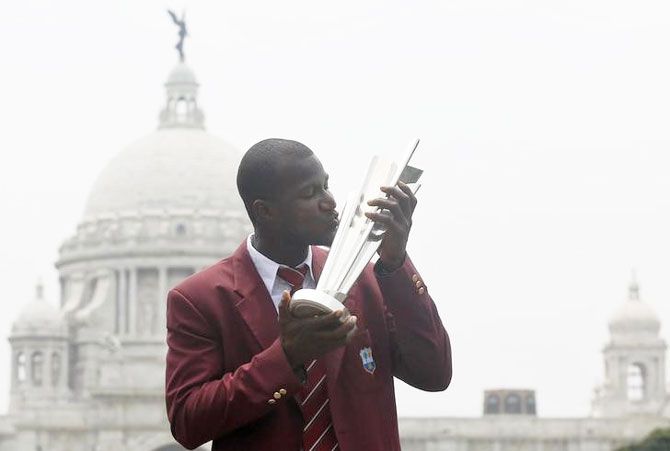How wonderful that this grand revival began in Kolkata, and under Clive Lloyd, the Windies' greatest captain, as the team manager, says V Gangadhar, a long-time fan of the West Indies team.

It's ten days since the maroon-clad West Indians defeated England in the thrilling World Cricket T20 final at Kolkata's famed Eden Gardens. The match is still being talked about. Windies skipper Darren Sammy, who remained supremely confident about the outcome, spoke about the game's David versus Goliath allegory.
Physically, the Caribbeans were stronger, taller and sturdier. When they pounded into bowl with sweat pouring from their bodies, they were an awesome sight.
But cricket is not all muscle power. The T20 format of the game called for physical fitness, intelligence and cricketing skills. The West Indies did have all these in abundance and once ruled the arena like the Roman gladiators of old.
For centuries they were slaves to the white men in the lush islands, but in games, particularly cricket and athletics, they annihilated the rest of the world. The white men taught them cricket and within decades the pupils had turned the tables on the masters. They did play together to represent the islands, but the white men were always the masters and captains though the coloureds were the better players.
The average West Indian could not gain admission to the all whites clubs. By the 1960s the white minority could not stop the flood of brilliant, talented, black players. One of them, Frank Worrell, was elevated as captain.
Worrell not only had shrewd cricketing skills, but he also achieved the unique and difficult job of uniting players from the different islands, making them a potent force under his captaincy. Within a decade-and-a-half, the islanders were world beaters, having vanquished England, running Australia a close second in the international rankings. West Indian players dominated English league and county cricket where they were welcomed.
Cricket needed new avenues to flaunt its content which came by way of competitive one day international cricket, the game getting over in a day with the two sides completing 50 overs each. The first one day international World Cup in 1975 saw the West Indians beat Australia. In 1979, it was England who lost to the West Indies in the final.
The invincible Windies led by Clive Lloyd excelled in every department of the game. But sheer overconfidence and arrogance brought about their downfall in the 1983 World Cup final. And, believe it not, the flukey winners were India, which celebrated as though there was no tomorrow.

One-day supremacy thereafter passed from one nation to another. The mighty West Indians lost their stars to age and depleting talent Their replacements were found lacking and the West Indies were gradually pushed to the bottom of the one-day table.
The topsy-turvydom in cricket rankings continued and only Australia held onto its top position most of the time. Sliding down rapidly in all forms of cricket, the West Indies were often at rock bottom.
India, where quantity and numbers were identified with quality, made headlines in view of its huge crowds lining up to watch all kinds of cricket including in this past decade T20 tamasha cricket.
'Action' was the keyword. When the one-day version was termed 'slow', the 20 over format was introduced and termed a hit. Tests were still popular in nations where normal cricket was patronised. South Africa became one of the best teams, but the saddest decline was in the West Indies which lost out on patrons, infrastructure and talent to the rest of the world.
Multi-island rivalry still pushed the game down, young West Indians took to basketball, which was more lucrative. A team, which was at the top in world cricket in every format, now shared the lower depths with teams like Afghanistan and the UAE.
No one wanted to host the Windies Test team. Its top players quit after bitter quarrels with the West Indies Cricket Board which insisted that they would be paid and made eligible for selection only if the players appeared at the Test match level.

Windies cricket continued under spells of great turbulence, occasionally yielding great players like Brian Lara. But their genius did not lift the team's performance. Unlike Sachin Tendulkar who often carried Indian batting on his shoulders, Lara was flashy and gorgeous to watch, yet lacked consistency.
India with its enormous resources survived better. Money was never lacking in India because the crowds, advertisers and broadcasters filled up the coffers. Riven by internal disputes and most of the star players on their own, the West Indians changed captains, coaches and board officials frequently.
World beaters like Chris Gayle, Dwayne Bravo and others sought their fortunes in independent T20 leagues which kept sprouting in the unlikeliest of places. Their talents generated huge personal incomes, but the others were left high and dry. The middle-level players were the most affected and their fortunes depended on the Windies selectors' whims.
It was like Indian cricket in the 1950s when the team was led by five captains in five Tests against the West Indies and were routed.
Inconsistency in form and performance did not affect the Indians' earning capacity. Crowds poured in to watch mediocrities take on other mediocrities, the television commentary handled year after year by incompetents. I was shocked that one of our senior television commentators -- a former captain -- earned Rs 9 million as commentary fees.

Both teams in the 2016 T20 World Cup final did not rank highly, their form just so-so. What was evident was enough bad temper, particularly from the white men.
Mark Nicholas. the 'respected' English commentator, labelled the West Indians as players 'without brains.' Nicholas apologised later, but the cut went deep like the one in 1976 when the then English captain Tony Greig boasted before a Caribbean tour that he would make the West Indians grovel.
Winning that series 3-0, battering and bruising the Englishmen with their fearsome four-member pace battery, Clive Lloyd and his men showed who made who grovel. Nicholas's inane remark reopened old wounds. Darren Sammy, the West Indies captain, said his team was deeply offended by Nicholas' comment.
Another white media 'star' Shane Warne made several digs at Marlon Samuels who top scored in the final and spurred Carlos Brathwaite to slam four successive sixes off Ben Stokes and finish the game in a hurry. The white loudmouths were shocked into silence.
Sammy declared before the final that every member of his team was confident of victory and played to a plan. Windies bowling coach Curtly Ambrose, the legendary fast bowler, said his team faced adversities which only united them to play for a win. The occasional hiccups brought out the team's hidden strengths, confirming Sammy's optimism that his players had a do or die attitude.
The euphoria after the Eden Gardens triumph is overwhelming. Michael Holding -- the sanest voice in West Indian cricket -- asked the team not to lose their heads and go overboard with the World Cup triumph. A stern critic of T20 cricket, Holding urged the West Indies board and the players to work together to revive the team's fortunes in Test cricket, which he feels is the only genuine format of cricket.
On a humid Kolkata night, Darren Sammy and his boys emphatically showed that the West Indians can never be taken lightly. How wonderful that this grand revival began in Kolkata, and under Clive Lloyd, the Windies' greatest captain, as the team manager.











